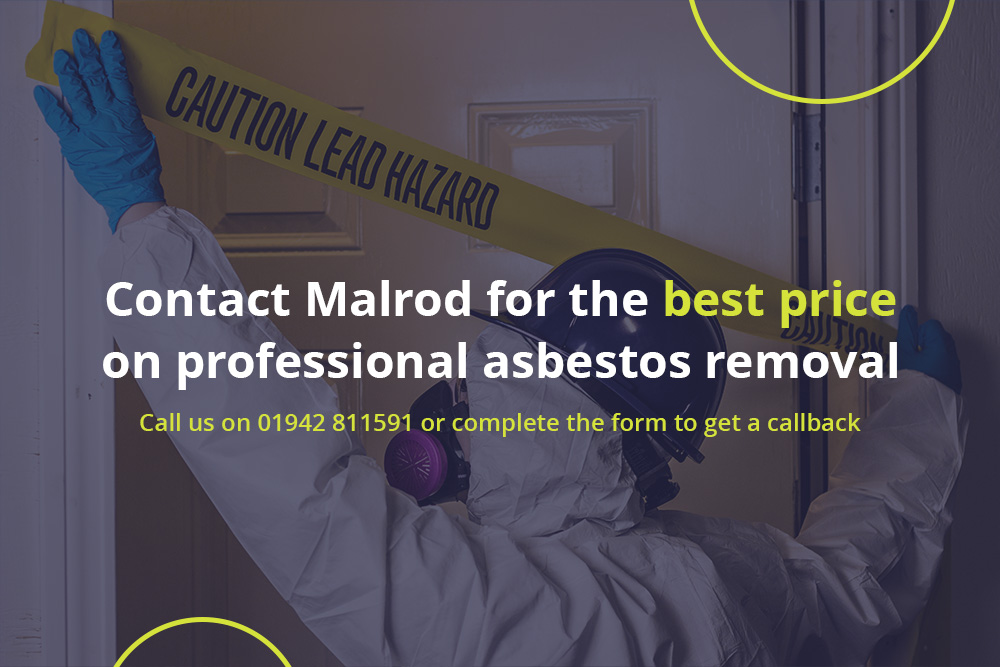
Malrod’s asbestos removal experts explain why asbestos is still a problem for UK citizens despite its ban, as well as when and why it was banned in the UK.
Contents
- When was asbestos banned in the UK?
- Why is asbestos still a problem if it is banned?
- Who can be at risk from exposure to asbestos?
- High-risk occupations
- Medium-risk occupations
- Low-risk occupations
- Is my property or building likely to contain asbestos?
- Choose Malrod to safely remove asbestos from your property
- Can you sell a house that contains asbestos?
- When was asbestos regulated in the UK?
- What year was asbestos banned in Europe?
- What is the fine for use of asbestos in the UK?
- Do you have to declare asbestos when selling property in the UK?
When was asbestos banned in the UK?
The banning of asbestos in the UK occurred in several stages, starting with a ban on blue and brown asbestos in 1985.
White asbestos continued to be used until the late 1990s, and a full ban on asbestos in the UK wasn’t implemented until November 1999.
The UK government largely ignored health warnings about asbestos for many years, as it was seen as an affordable, widely available, strong, and effective building material.
By the 1970s and 1980s, more people were suffering from asbestos-related diseases, which put pressure on hospitals.
In 1985, the first real asbestos ban in the UK was implemented.
Why is asbestos still a problem if it is banned?
The importation, supply, and use of all asbestos have been banned in the UK since 1999; the amphibole type has been banned since 1985.
Asbestos is still a problem in the UK even though it has been banned since 1999 (amphibole type banned since 1985). This is because it can take many years for asbestos-related diseases to develop after exposure, and there are still many buildings in the UK that contain asbestos.
Although asbestos is not harmful when left alone, any disturbance of the material could release fibers that can be inhaled or ingested, leading to health risks. It is therefore crucial for those responsible for managing buildings to comply with relevant asbestos regulations to ensure the highest standards of health and safety.
Who can be at risk from exposure to asbestos?
Asbestos was widely used in various industries in the UK, making those who have worked directly or indirectly with it at risk. Construction workers, particularly pre-ban, and shipbuilders before the 1980s are at higher risk due to heavy asbestos use in their industries. Here are some examples of occupations most at risk of exposure to asbestos:
High-risk occupations
- Painters
- Decorators
- Boilermakers
- Construction workers
- Firefighters
- Industrial workers
- Power plant workers
- Shipyard workers
- Demolition crews
- Insulators
- Steel mill workers
- Textile mill workers
Medium-risk occupations
- Agricultural workers
- Mechanics
- Blacksmiths
- Carpenters
- Cement plant workers
- Chemical plant workers
- Engineers
- HVAC Engineers
- Electricians
- Linotype technicians
- Metal workers
- Oil refinery workers
- Paper mill workers
- Plumbers
- Railroad workers
Low-risk occupations
- Aerospace workers
- Aircraft mechanics
- Appliance installers
- Bakers
- Chimney sweeps
- Hairdressers
- Teachers
- Tenants
- Toll collectors
- Warehouse workers
Is my property or building likely to contain asbestos?
For commercial (non-domestic) properties built before 2000, an asbestos survey is usually necessary to determine whether asbestos is present.
Properties built around 2000 may also require a survey, as some began construction before the ban but were completed after it. Although there should be no asbestos in properties built after the ban, vigilance is still required as there have been cases where asbestos-containing products were used in buildings or machinery installed.
Illegal importation of asbestos-containing products can also occur, and it’s important to ensure that older machinery and equipment do not contain asbestos.
Exemption certificates can be applied in certain cases, such as for vintage trains or museum pieces under the REACH Regulations.
Choose Malrod to safely remove asbestos from your property
If you have asbestos on your property, it’s your responsibility to have the risk surveyed and then removed to minimise the chance of exposure in your home or business. Malrod relies on 50 years of experience when removing asbestos in the UK.
Our team of specialist asbestos contractors is fully licenced and insured to carry out the task efficiently and safely.
Not sure if your property contains asbestos? Book an asbestos survey with the team.
FAQs
Can you sell a house that contains asbestos?
While it is not illegal to sell a property with asbestos, you must disclose its presence if you’re aware of it.
Not disclosing such information is considered an offense under The Property Misdescriptions Act 2013, which can lead to the invalidation of the sale and prosecution.
When was asbestos regulated in the UK?
Asbestos has been regulated in the UK since 1985 when the use of the amphibole type was banned. The importation, supply, and use of all types of asbestos were completely banned in 1999.
What year was asbestos banned in Europe?
The European Union (EU) banned all forms of asbestos in 2005 through Directive 1999/77/EC, which prohibited the extraction, processing, and marketing of all asbestos products.
Some EU Member States, such as Sweden and Germany, had already implemented their own national bans prior to the EU-wide ban.
What is the fine for use of asbestos in the UK?
The penalties for use of asbestos in the UK include a fine of up to £20,000 while serious cases can also result in imprisonment for up to 12 months.
Do you have to declare asbestos when selling property in the UK?
Legally, you must disclose the presence of asbestos when selling your home if you are aware of it.
Book a comprehensive asbestos survey today.

